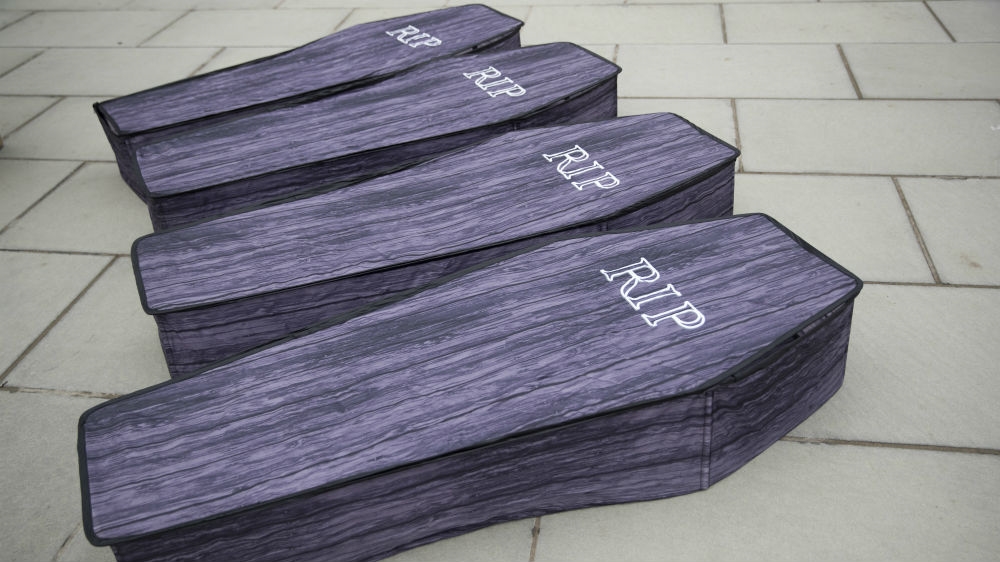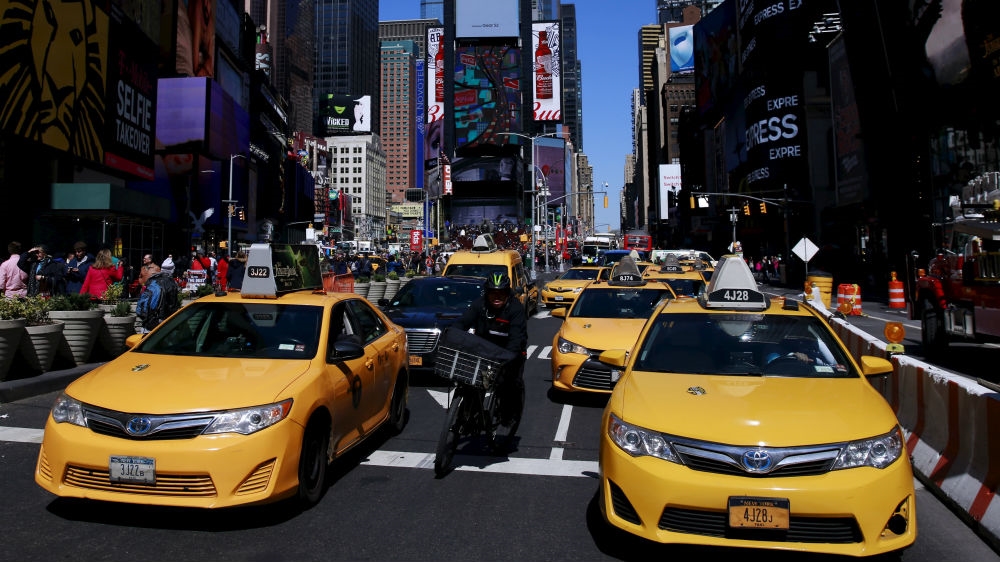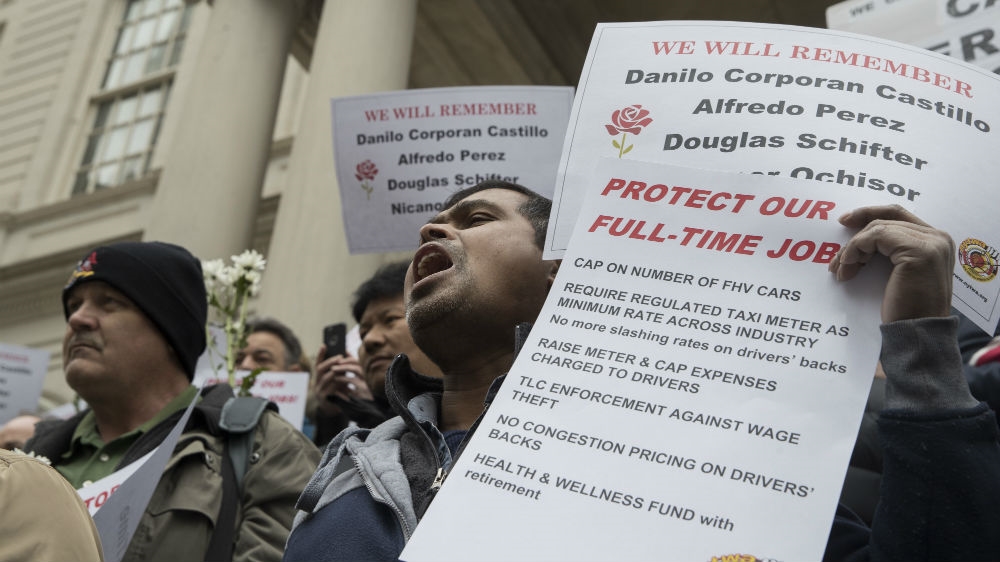Six NYC taxi drivers have committed suicide since November
New York City, USA – New York City taxi driver Nicanor Ochisor went extremely quiet last March.
According to his son, Gabriel, Ochisor delayed buying tools to fix his taxi for a maintenance check.
In hindsight, Gabriel thought that was odd, considering his father never kept such issues unattended.
But at the time, Gabriel didn’t think much of it.
On the morning of March 16, the day before the scheduled check, Ochisor paid his pending bills, left his jacket and phone on the dining table, and hanged himself in the garage of their family home in Maspeth, Queens.
Although the day was a shock to his family and friends, they had recognised signs of his depression in the lead up to his death.
“We saw it, my mother saw it for sure,” Gabriel said in a calm voice as his son played in front of him in their family home. “It moved so quick. He was getting depressed probably prior to this, but not to this point I guess.”
Six suicides in just over seven months
Ochisor, a Romanian immigrant, is one of six New York City taxi drivers to take his life since November 2017, according to New York Taxi Workers Alliance (NYTWA).
The first, Alfredo Perez, hanged himself in November.
The following month, on December 20, Danilo Castillo Corporan jumped from the window of his Manhattan apartment, according to local media. In a suicide note, the 57-year-old blamed the “disastrous industry”.
 |
| Six New York City for-hire drivers have killed themselves since November last year, prompting protests in recent months [File: Mary Altaffer/AP Photo] |
Then, in February, 61-year-old Doug Schifter, posted a lengthy note on Facebook, calling the business a “slave” industry and accusing politicians and the Taxi Commission of having a “strong bias” towards ride-sharing apps like Uber. Hours later he shot himself outside of City Hall in Lower Manhattan.
Then, came Ochisor’s death just a month later.
In May, the body of Yu Mein Chow, an immigrant from Myanmar who was known among friends as “Kenny”, was found floating in the East River, not far from the Brooklyn Bridge.
His brother, Richard Chow, told Al Jazeera that he had recently taken out a $700,000 loan to buy a medallion, which is needed to operate a cab in the city. Chow’s death was determined to be a suicide by the medical examiner.
 |
| Yu Mein Chow went missing for two weeks before his body was found floating in the East River, not far from the Brooklyn Bridge [Samira Sadeque/Al Jazeera] |
Less than a month later, on the third Friday of June, as Muslims across New York began their Eid celebrations, 59-year-old Abdul Saleh hanged himself by an electric cord in his room in Brooklyn. Saleh, a Yemeni immigrant, was struggling to pay for the lease on his vehicle, local media reported.
The drivers’ jobs – mainly driving yellow cabs – are iconic to New York’s landscape, but with the industry in steep decline as ride-sharing apps emerge, many face mounting financial pressure that has simply become unbearable. Now, drivers hope that new legislation temporarily capping the number of drivers for those apps will relieve some of the pressure.
Medallion values plummet
Traditionally, drivers have invested in the medallion, which they would pay off over the years and then lease out during their retirement. In 2013, the price of a medallion hit $1.3m, but its value plunged last year when one sold for less than $250,000, according to local media.
“My plan was to retire at the age of 62, and give the medallion to a broker and lease it,” said Nicolae Hent, a cab driver and a friend of Ochisor’s who also immigrated from Romania.
“I’m turning 62 in December, and now I can’t retire. So probably I have to work until I die if things don’t change in the city,” he told Al Jazeera.
The drop in price of the medallion appeared to coincide, at least in part, with the emergence of ride-sharing apps such as Uber and Lyft.
While the apps first came to New York in 2011, their popularity has grown exponentially in recent years. Reports show that between the first quarter of 2014 and that of 2018, ride-sharing went from eight percent in the business traveller ground transport market to 70.5 percent, while taxi driving dropped from 37 percent to six percent in the same time span.
This may be, in part, because there is a cap on medallions of only 13,587 vehicles.
Until this week, there were no caps for ride-sharing apps, making it challenging for taxi drivers to compete against them. Not only are their prices lower, their supply is higher as well.
We have to work longer, drive more, we’re sleeping less, we’re spending less time with our families and on the vacation times we used to have years ago.
Solomon Neuschatz, New York City yellow cab driver
“Uber has brought so many cars, that we don’t have any job to do,” said Lal Singh, a taxi driver who migrated from Punjab, India. “We keep going around and around for longer hours. We’re starving.”
Solomon Neuschatz, another yellow cab driver who knew Ochisor for more than 15 years and was one of the last people to see him before his suicide, said it’s been harder for drivers over the last year.
“We have to work longer, drive more, we’re sleeping less, we’re spending less time with our families and on the vacation times we used to have years ago,” he told Al Jazeera.
 |
| The price of the medallion has plummeted in recent years [File: Lucas Jackson/Reuters] |
The long hours and sometimes hours of isolation is often too much for drivers to handle, said Bhairavi Desai, executive director of the NYTWA.
“What we’re seeing today, it’s a despair, a very particular sort of depression, a desperation due to financial ruin,” Desai added.
Additionally, ride-sharing drivers need a license for a few hundred dollars, unlike taxi drivers who invest thousands in medallions or on leasing their taxi monthly.
New cap on ride-sharing drivers
The financial burdens, as well as the emotional and physical strain led many taxi drivers and their advocates to push for more government regulations on ride-sharing services. On Tuesday, they scored a major victory, when New York City Mayor Bill de Blasio signed recently passed legislation that limits the number of ride-share vehicles.
Under the new laws, the city’s Taxi and Limousine Commission will stop issuing new for-hire vehicle licenses for a year while the city studies both the environmental and economic impact of the services.
It also seeks to improve working conditions of the more than 100,000 for-hire drivers in the city, including imposing a minimum driver pay rate.
“The city is sending a clear message: we’re putting hard-working New Yorkers ahead of corporations,” de Blasio said during the bill signing ceremony.
 |
| Drivers chant slogans during a rally held by the New York Taxi Workers Alliance Members in March [Mary Altaffer/AP Photo] |
In a statement to Al Jazeera, Uber said the regulation will “threaten one of the few reliable transportation options, while doing nothing to fix the subways or ease congestion”.
Other critics argue that limiting ride-sharing apps will unfairly affect those who struggle to find a ride.
In a statement to local media after the passage of the new policy, Lyft said: “These sweeping cuts to transportation will bring New Yorkers back to an era of struggling to get a ride, particularly for communities of color and in the outer boroughs.”
But NYTWA’s Desai welcomed the legislation, calling it a “blueprint for the rest of the rest of the world”.
“Driver incomes across all sectors have been in a downward spiral as Uber and Lyft flooded our streets. The immediate cap on new For-Hire-Vehicles puts a stop to that. Now, yellow taxi, green cab, black car, livery, Uber and Lyft drivers can finally hope for stability,” she said in a statement.
You cannot run a business of the taxi industry where I have to follow the metre laws but they can do whatever they want. So this is where now we’re going to be moving forward.
Solomon Neuschatz, New York City taxi driver
And for the family and friends of the taxi drivers who committed suicide, the new regulation may be the answer they were hoping for.
“[Nicanor] would be very happy, he would shake the mayor’s hand,” said driver Neuschatz, the friend of Nicanor Ochisor.
“You cannot run a business of the taxi industry where I have to follow the metre laws but they can do whatever they want. So this is where now we’re going to be moving forward,” he told Al Jazeera.
“This bill is going to help to ensure that now we will be able to have a better life in the industry where nobody should have to work so hard to make pennies.”
Neuschatz said he will attend a memorial service for Ochisor on Sunday. There, he will tell his late friend about the new rules.
“I will tell Nicanor over there in the church, I will tell him what happened. Although I know he’s looking down upon us, [and knows we] are happy.”




